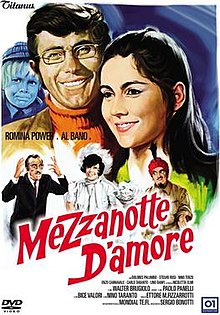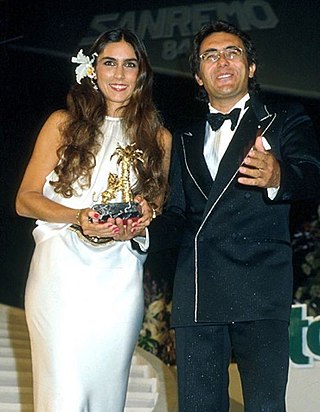
Al Bano and Romina Power are an Italian-American pop music duo formed in 1975 by then-married couple Italian tenor Albano Carrisi and American singer Romina Power, the daughter of Hollywood actor Tyrone Power. They have recorded over 22 albums, which have sold 150 million copies across six decades. Their best known international hits include "Felicità", "Sharazan", "Tu, soltanto tu ", "Ci sarà", "Sempre sempre", and "Libertà!". They participated twice in the Eurovision Song Contest in 1976 and 1985 and performed five times at the Sanremo Music Festival, winning in 1984 with the song "Ci sarà". The couple also shot seven films, based on their songs, between 1967 and 1984. The two separated in 1999 and divorced in 2012, but reunited professionally in 2013.

Nino Taranto was an Italian film actor. He appeared in more than 80 films between 1924 and 1971.

The musicarello is a film subgenre which emerged in Italy and which is characterised by the presence in main roles of young singers, already famous among their peers, and their new record album. In the films there are almost always tender and chaste love stories accompanied by the desire to have fun and dance without thoughts. Musicarelli reflect the desire and need for emancipation of young Italians, highlighting some generational frictions. The genre began in the late 1950s, and had its peak of production in the 1960s.
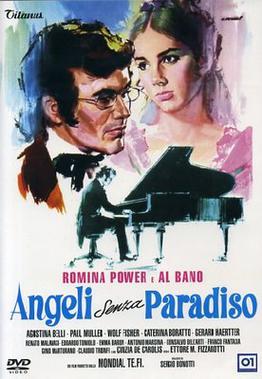
Angeli senza paradiso is a 1970 Italian musicarello romance film directed by Ettore Maria Fizzarotti. It is an unofficial remake of the 1933 film Gently My Songs Entreat by Willi Forst.

Nel sole is a 1967 Italian musicarello romantic comedy film directed by Aldo Grimaldi. The title is a reference to the Al Bano's hit song with the same name.

Ma chi t'ha dato la patente? is a 1970 Italian comedy film directed by Nando Cicero starring the comic duo Franco and Ciccio.

Tears on Your Face is a 1964 Italian musicarello film directed by Ettore Maria Fizzarotti. Its Italian title is taken from the hit song of the same name by the film's star Bobby Solo.

Ettore Maria Fizzarotti was an Italian film director and screenwriter.

Lo smemorato di Collegno is a 1962 commedia all'italiana film directed by Sergio Corbucci. It is loosely based on the Bruneri-Canella case.
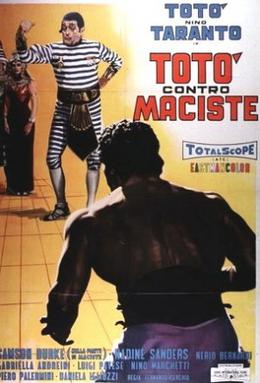
Toto vs. Maciste is a 1962 Italian adventure-comedy film directed by Fernando Cerchio. It is a parody of the Sword and Sandal cinema, which was highly successful at the time in Italy.

Il suo nome è Donna Rosa is a 1969 Italian musicarello romantic comedy film directed by Ettore Maria Fizzarotti and starring Al Bano and Romina Power.

L'oro del mondo is a 1968 Italian musicarello comedy film directed by Aldo Grimaldi and starring Al Bano and Romina Power.
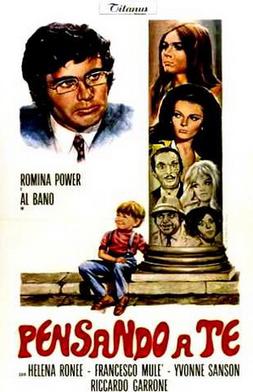
Pensando a te is a 1969 Italian musicarello comedy film directed by Aldo Grimaldi and starring Al Bano and Romina Power.

Champagne in paradiso is a 1984 Italian musicarello comedy film directed by Aldo Grimaldi and starring Al Bano and Romina Power. It is the last film of the couple.

Il ragazzo che sorride is a 1969 Italian musicarello comedy film directed by Aldo Grimaldi and starring Al Bano and Susanna Martinková.
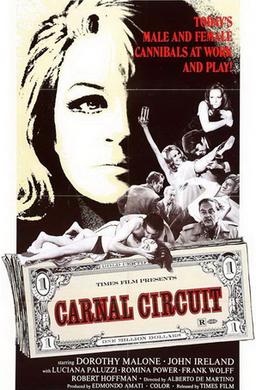
Carnal Circuit is a 1969 Italian-German giallo written and directed by Alberto De Martino.

Arrivano i dollari! is a 1957 Italian comedy film directed by Mario Costa and starring Alberto Sordi, Nino Taranto and Isa Miranda.

The Avenger of Venice is a 1964 adventure film written and directed by Piero Pierotti and Carlo Campogalliani and starring Brett Halsey and Gianna Maria Canale. It is based on a novel by Michel Zevaco.

Nessuno mi può giudicare is a 1966 Italian "musicarello" film directed by Ettore Maria Fizzarotti. It is named after the Caterina Caselli's hit song "Nessuno mi può giudicare". It had a sequel titled Perdono released the same year.

Perdono is a 1966 Italian "musicarello" film directed by Ettore Maria Fizzarotti. It is named after the Caterina Caselli's hit song "Perdono". It is the sequel to Nessuno mi può giudicare.
